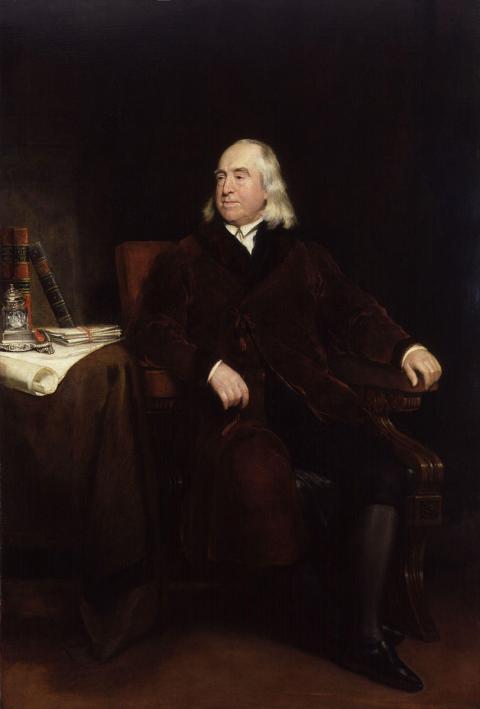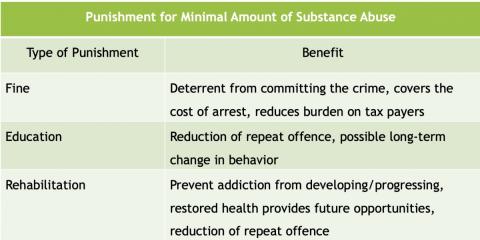Can Utilitarianism Improve the US Criminal Justice System? An Evaluation of Punishment and the Utility Calculus
Utilitarianism is a philosophy that values the greatest amount of happiness for the greatest number of people (Driver 2014). Utilitarianism was created by European philosophers Jeremy Bentham and John Stuart Mill throughout the late eighteenth and nineteenth century. Bentham believed that when a government is based on utilitarianism, a system of law and reason is created that values happiness as its foremost principle (Bentham 1789). To provide a mechanism for utilitarianism to be applied to governmental policy, Benthem created the utility calculus. The utility calculus is a set of specific questions designed to evaluate a situation and propose the response or action a government should take to maximize happiness and minimize unnecessary pain.

Painting of Jeremy Bentham, the founder of Utilitarianism, by Henry William Pickersgill 1829. https://www.npg.org.uk/collections/
As a philosophy and political science double major interested in political theory, I found Bentham and Mill’s goal of valuing happiness in government to be intriguing and inspiring. After hearing about Bentham’s theories of government in a Social and Political Philosophy class taught by Professor Nick Smith, I began contemplating how utilitarianism and the utility calculus could be implemented into governmental systems.
To support my research, I received funding from a Research Experience and Apprenticeship Program (REAP) grant through the University of New Hampshire’s Hamel Center for Undergraduate Research. Nick Smith, my research mentor and adviser, helped me narrow my research goal: to determine if the philosophy of utilitarianism, and specifically the utility calculus, could have a positive effect on drug sentencing in the United States criminal justice system.
I took particular interest in the ideological purpose behind US judicial laws. The US criminal justice system does not operate under a single clear ideology. Instead, multiple ideologies create inconsistency between the actions and stances the US criminal justice system takes. However, many of the actions the US takes, such as some states’ use of the death penalty, are justified using retributionist methodology. This means that punishments, mainly prison terms, are allotted because the individual is deemed to deserve punishment, not necessarily because society or the individual will benefit from the punishment.
I took issue with the concept of retribution, specifically when used in cases of nonviolent crimes, such as drug offenses, and found retribution morally questionable because of its reliance on punishment regardless of extenuating circumstances. I began contemplating whether the utilitarian goal to create happiness could provide a solution to problems such as high recidivism rates, a retributionist theme, and a lack of consideration for convicts’ futures. Given these problems, I wanted to see if Bentham’s utility calculus could provide a beneficial alternative to current policies for drug sentencing in the United States.
The Utility Calculus: Definition and Criticisms
Jeremy Bentham designed the utility calculus as a mechanism to apply utilitarian values to government policies; however, I discovered that the utility calculus is incredibly complex and relative. The utility calculus is a series of questions (see Appendix) that are circumstantial and subjective. For example, the calculus asks us to calculate the amount of pain someone will experience as a result of punishment. This becomes complicated in cases such as incarceration where, because of issues related to reintegrating into society with a criminal record, the pain that results from punishment lasts longer than the duration of the prison sentence. Moreover, the concept of pain is subjective; each person experiences pain differently. It is impossible for anyone to truly determine how much pain another person will experience as a result of punishment.
Because of its complexity and subjectivity, the utility calculus is impractical as a tool for every individual judicial case. As Bentham himself acknowledged, an accompanying set of sentencing guidelines, similar to modern mandatory minimums, must be used when applying utilitarianism to government policies (Burton 1843). I realized that although standard sentencing guidelines based on utilitarian values could not be applied uniformly to every individual case, they could effectively outline punishments for each category of crime and maximize utility in a practical manner.
Developing Utilitarian Sentencing Guidelines
The next step in my research was to formulate hypothetical utilitarian sentencing guidelines for the category of crime I wanted to focus on: drug crimes. I created hypothetical utilitarian guidelines based on my knowledge of how drug crimes are currently categorized (e.g., crimes for possession of drugs are separated from crimes for drug use) and punished (e.g., mandatory minimums and three-strikes laws). Next, by answering its questions, I determined whether the utility calculus would permit certain punishments. I answered these questions, such as those asking about the duration and extent of pain caused by each respective punishment, to the best of my ability, considering the subjectivity and difficulty associated with using the utility calculus. To compensate for this complexity, I kept an overarching utilitarian goal in mind: maximizing happiness. I then evaluated whether each proposed utilitarian punishment, recommended by the standard sentencing guidelines, would have a positive or negative effect on society.
A Hypothetical Utilitarian Guideline for Punishment
One type of punishment I considered was for people convicted of using a small amount of an illegal substance. For this crime, my hypothetical sentencing guideline would consist of three components: (1) a small fine, (2) education, and (3) minimal rehabilitation and medical care if needed. Although this approach differs from typical US punishments, which rely heavily on incarceration, utilitarians often believe “reform might be better achieved by early education and by drug rehabilitation than by incarceration” (Binder and Smith, 2000: 116).

Figure 1: A table depicting how I organized the different aspects of a hypothetical utilitarian punishment for minimal amounts of substance abuse.
I included a fine in my hypothetical sentencing guideline to serve as a deterrent to engaging in substance abuse, both to prevent the offender from engaging in substance abuse in the future and to serve as a threat to prevent the general public from engaging in such criminal behavior. The fine would also be designed to cover the costs associated with the arrest and punishment of the convict to alleviate this financial burden on taxpayers. This punishment is supported by utilitarianism because the happiness of the taxpayers would increase in proportion to the decrease of their taxes. The happiness of the offender and people who would potentially consider committing a crime in the future would also increase because they would be deterred from consuming illegal substances.
Second, after undergoing governmental education programs on the harmful repercussions of consuming illicit drugs, the offender would be less likely to engage in substance abuse in the future. Education typically causes minimal pain and has the possibility of creating an extreme amount of long-term happiness if convicts learn to change their behavior. The financial cost of education typically is not extravagant and does not outweigh the long-term positives and happiness that education produces. Education as punishment would be justified under utilitarianism because there would be little financial harm and the possibility of the great positive effect of reducing crime.
The third component of my hypothetical guideline, rehabilitation or medical care, would be used in cases where the offender exhibited signs of addiction or suffered health problems related to drug use. The rehabilitation would be designed to stop the addiction before the onset of a more serious problem. Medical care would be provided to help the individual recover from any physical harm caused by the illicit substance, including withdrawal symptoms. After rehabilitation, the individual would be in an improved physical and mental state; therefore, the temptation to use the illicit drug would be reduced and the happiness of the offender would increase. Thus, the pain associated with the financial cost of such programs would be mitigated by the long-term happiness the offender experienced.
The Harms of Using Standard Guidelines
Despite the utility calculus’s appealing goal of creating happiness, I was unhappy with the results when I applied these hypothetical sentencing guidelines to specific examples of drug crimes. Even though I designed my sentencing guidelines using utilitarian principles, as described for a drug-use crime above, it is impossible for any standard sentencing guideline to properly address the complexities of every criminal case.
Consider how a utilitarian sentencing guideline for selling illegal drugs would punish a single mother in poverty who is coerced by gang members into selling drugs and is caught by law enforcement. Despite the extenuating circumstances of the case, a judge in a utilitarian system would have little choice but to issue the standard sentence recommended by the utility calculus. For instance, a reasonable utilitarian sentencing guideline for drug dealers could include a large fine to cover the rehabilitation costs of those to whom they sold drugs; however, it would be unreasonable and unethical to expect the single mother in poverty to pay this large fine when she was coerced into selling drugs. This situation ignores the complexities of the mother’s case, causing both her and her children a significant amount of unnecessary pain. Even in more simplistic cases, such as one in which no coercion is involved but a family relies upon the mother’s income, giving the mother a large fine would unjustly affect her dependents. Therefore, standard utilitarian sentencing guidelines should not be permitted because of their inability to provide ethical and just punishments for every complex and individual criminal case.
An Alternative Solution: The Implementation of Utilitarian Values
I came to the conclusion that implementing utilitarian values within the US justice system, rather than applying the utility calculus or utilitarian standard sentencing guidelines, would have the most beneficial effect. By integrating the utilitarian value of happiness and unconventional punishments, such as rehabilitation and education, the happiness of convicts and society in general could increase. This implementation would be drafted by legislators aiming to include the utilitarian value of creating happiness when possible as a comprehensive goal for the US criminal justice system, similar to how many Scandinavian countries have the goal of humane treatment and reintegration into society (Zoukis 2017). As a result, the focus of punishment would likely change from incarceration to rehabilitation. Treating offenders in a humane fashion dedicated to reintegration into society, by means such as education or job training, would result in happier offenders with lower recidivism rates and a better chance of future success (Zoukis 2017). Moreover, a low recidivism rate would increase the happiness of society because taxpayers do not have to pay for multiple prison sentences and can benefit from the offender becoming a productive member of society.

The author, Piper Gibson. Photo by Clarissa Williams.
Because of the influence that utilitarianism and drug-related problems have on the political and philosophical world, I hope that my research will help both fields address some of the complex issues the world is facing. I know that the knowledge I gained through REAP will contribute to my own understanding of these complexities in the political world, allowing me to bring a well-rounded understanding of utilitarianism to my studies as I pursue a double major in philosophy and political science.
I believe that the utilitarian perspective of looking at a situation holistically with the goal of creating happiness could have an overall positive effect on the United States criminal justice system, despite the problems associated specifically with the utility calculus. I hope that looking at the American people holistically and valuing their happiness will have an increasingly significant presence in United States policy. I also hope that by contemplating my conclusion, readers will have an increased investment in understanding the methodology of punishment and how this methodology could be improved and clarified in the United States.
I would like to thank the Hamel Center for Undergraduate Research for their consistent dedication to ensuring that UNH students receive amazing research opportunities throughout their undergraduate experience. I would like to specifically thank the REAP program, Mr. Dana Hamel, and the Rogers Family Undergraduate Research Fund for supporting my research that made this article happen. I would also like to thank my mentor, Professor Nick Smith, who has been one of my most valued mentors. With Professor Smith’s help, I have had a rich academic experience at the University of New Hampshire that has featured a multitude of wonderful opportunities, including but not limited to the REAP, which led to the creation of this Inquiry commentary. Specifically, I would like to thank Professor Smith for his guidance throughout the REAP process, including mentoring me on the complexities of utilitarianism and the US criminal justice system and guiding me throughout the process of creating an extensive philosophical research paper. Lastly, I would like to thank my friends and family for always supporting me. Their continued love and support serves as my north star throughout every endeavor I undertake in life.
Appendix
Jeremy Bentham’s System of Measuring Pain and Pleasure
As written in Bentham, Jeremy. “Principles of Morals.” Chapter 4:22-23
To a person (considered by himself) the value of a pleasure or pain (considered by itself) will be greater or less according to:
(1) its intensity.
(2) its duration.
(3) its certainty or uncertainty.
(4) its nearness or remoteness.
These are the circumstances that are to be considered when estimating a pleasure or a pain considered by itself. But when the value of a pleasure or pain is considered for the purpose of estimating the tendency of an act by which it is produced, two other circumstances must be taken into the account:
(5) its fecundity, i.e. its chance of being followed by sensations of the same kind (pleasure by pleasure, pain by pain), and
(6) its purity, i.e. its chance of not being followed by sensations of the opposite kind (pleasure by pain, pain by pleasure).
These last two, however, are not strictly properties of the pleasure or the pain itself, so they aren’t strictly to be taken into the account of the value of that pleasure or pain. They are really only properties of the act or other event by which such pleasure or pain has been produced; so they are only to be taken into the account of the tendency of that act or event.
For many people the value of a pleasure or a pain will be greater or less according to seven circumstances—the six preceding ones and one other, namely
(7) its extent, i.e. the number of persons to whom it extends or (in other words) who are affected by it.
Works Cited
Bentham, Jeremy. “Principles of Morals.” Early Modern History, 1789. www.earlymoderntexts.com/assets/pdfs/bentham1780.pdf
Binder, Guyora, and Nicholas J Smith. “Framed: Utilitarianism and Punishment of the Innocent.” Rutgers Law Journal, vol. 32, no. 1, 2000.
Burton, John Hill. “The Works of Bentham.” The Works of Jeremy Bentham, Vol. 10 (Memoirs Part I and Correspondence),1843. Online Library of Liberty, https://oll.libertyfund.org/titles/bentham-the-works-of-jeremy-bentham-vol-10-memoirs-part-i-and-correspondence
Driver, Julia. “The History of Utilitarianism.” Stanford Encyclopedia of Philosophy, Stanford University, 22 Sept. 2014, plato.stanford.edu/entries/utilitarianism-history/.
Zoukis, Christopher. “Not the Worst, but Not Norway: US Prisons vs. Other Models.” HuffPost, 6 Sept. 2017, www.huffpost.com/entry/not-the-worst-but-not-norway-us-prisons-vs-other_...
Author and Mentor Bios
Piper Gibson is from Colebrook, Connecticut. At the University of New Hampshire (UNH) she is working toward a bachelor of arts degree, with a double major in political science and philosophy and a minor in classics. She is enrolled in the University Honors Program and pursuing Honors in Major in political science and philosophy. Her research was completed as part of the Research Experience and Apprenticeship Program (REAP) through the Hamel Center for Undergraduate Research. Piper says her lifelong goal is “to try to help those who have been left behind by society and governments.” When she first learned about utilitarianism in a social and political philosophy class taught by Nick Smith, her interest was piqued and she decided to pursue independent research on the subject. Piper enjoyed applying philosophical theories to real-life scenarios. She hopes to be a professor of social and political philosophy in the future and to provide students with a well-grounded understanding of the theories and policies that affect the world around them, as well as the skills needed to deliberate on whether these theories and policies have a positive or negative effect.
Nick Smith is professor and chairperson of the University of New Hampshire (UNH) Department of Philosophy. He has been at UNH since 2002. Before coming to UNH, Smith, who holds a JD and PhD, worked as a litigator for a private law firm and as a judicial clerk for the Honorable R. L. Nygaard of the United States Court of Appeals for the Third Circuit. He has published two books on his studies of the meaning and role of apologies in justice and contributes regularly to interviews in national media outlets. Smith has mentored many undergraduate researchers at UNH and considers it “one of the genuine highlights of teaching at UNH.” Dr. Smith first met Piper when she was a junior high school student attending the Future Leaders Institute—a summer philosophy camp he directed with classics professor Scott Smith.
Copyright 2020, Piper Gibson
